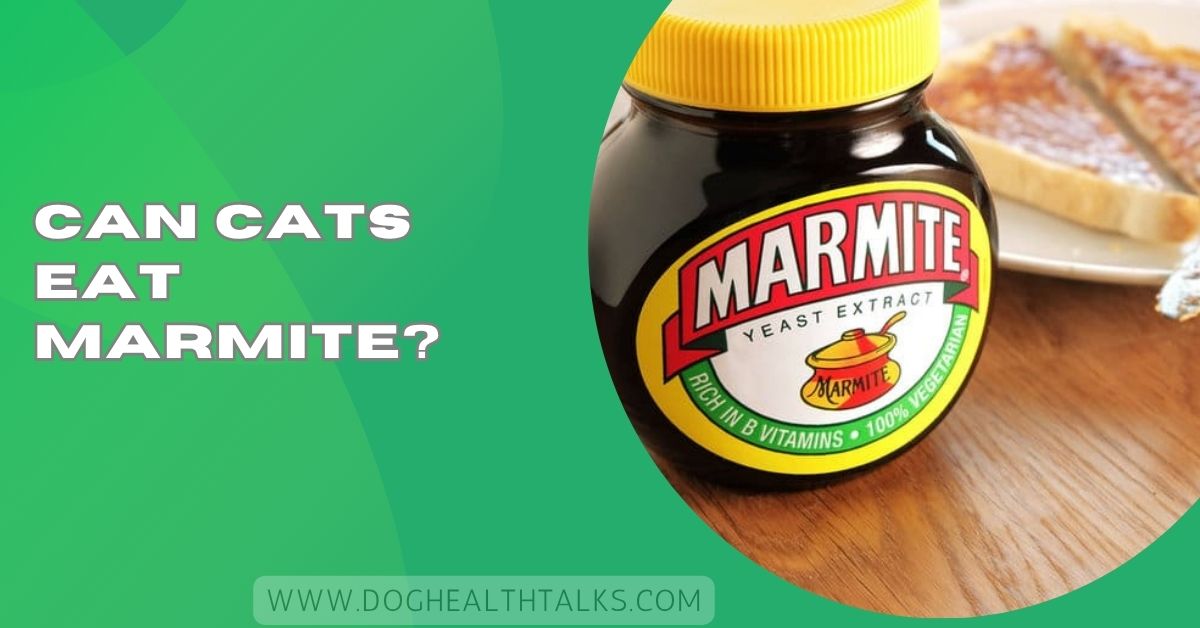Can Cats Eat Marmite?: Risks, Benefits, and Expert Advice!
Cats are naturally curious — especially when it comes to the food we eat. If you’ve ever spread Marmite on your toast and noticed your cat trying to sneak a lick, you’re not alone!
Cats can eat a very small amount of Marmite safely, but it’s not recommended. Marmite is extremely salty and offers no health benefits. Too much can harm your cat’s kidneys and cause salt poisoning.
Let’s find out what makes Marmite tempting to cats, and whether it’s safe or risky for their health.
What Exactly Is Marmite?
Marmite is a sticky, dark brown spread made from yeast extract, a by-product of beer brewing. It’s rich in B vitamins and has a strong, salty, umami flavor that people either love or hate.
While it’s marketed as a nutritious, vitamin-packed food for humans, Marmite is extremely high in sodium — which is one of the biggest red flags for cats.
To a cat, Marmite’s smell can resemble meaty or savory aromas, but nutritionally, it’s not even close to what cats need. Cats are obligate carnivores, meaning their bodies are designed to digest meat — not plant-based, salty spreads like Marmite.
Why Do Cats Seem to Love Marmite?
Many cat owners are puzzled when their cats seem fascinated by Marmite. It turns out there’s a science behind it.
Cats have a keen sense of smell — up to 14 times stronger than humans. Marmite’s strong aroma and “meaty” scent can easily attract them. The yeast extract releases glutamates, which create that rich umami flavor that mimics the smell of meat or fish.
However, cats’ taste buds are quite different from ours. They can’t taste sweetness, but they are drawn to salty and savory smells. So, while your cat might think Marmite smells like a tasty treat, it doesn’t provide the nutrition their body needs — only unnecessary salt and additives.
Can Cats Eat Marmite Safely?

The quick answer: A small lick is not toxic — but regular feeding is unsafe.
According to veterinarians, Marmite isn’t poisonous in tiny amounts, but it should never become part of your cat’s diet. The sodium content in Marmite is the main concern — too much salt can cause dehydration, high blood pressure, or even salt poisoning in cats.
There’s also no nutritional benefit for cats in Marmite. While it’s marketed as a good source of B vitamins for humans, cats get all the vitamins they need from a balanced, meat-based diet. Feeding Marmite regularly can disrupt that balance.
In short: Don’t panic if your cat licked Marmite once, but it’s best to keep the jar out of paw’s reach.
The Dangers of Feeding Marmite to Cats
Let’s look closer at the possible risks of Marmite for cats:
High Salt Content
Marmite contains about 10% sodium. For cats, even a small amount can exceed their daily sodium requirement. High salt intake can cause:
- Excessive thirst
- Vomiting and diarrhea
- Lethargy
- Kidney stress or sodium poisoning (in large amounts)
No Protein or Fiber
Cats depend on animal proteins for energy and health. Marmite offers none — it’s entirely plant-based. This makes it empty calories with no nutritional value.
B Vitamins: Not Worth the Risk
Yes, Marmite contains B vitamins like B12, niacin, and folate. But these are already present in good-quality cat food — in safe, species-appropriate amounts. Over-supplementation can sometimes do more harm than good.
Underlying Health Conditions
If your cat has kidney disease, heart problems, or hypertension, Marmite can be especially dangerous. Salt-heavy foods can worsen these conditions rapidly.
How Much Marmite Is Too Much for Cats?
Even a half teaspoon of Marmite can be too salty for a small cat. To put that in perspective:
- A healthy adult cat should consume less than 42 mg of sodium per day.
- Just one teaspoon of Marmite can contain over 150 mg of sodium — nearly four times what’s safe for a cat.
So, while a curious lick won’t cause harm, more than that could easily upset your cat’s electrolyte balance and stress their kidneys.
If your cat eats a spoonful or more, call your veterinarian right away. Symptoms of salt toxicity can appear within hours and may include vomiting, trembling, or loss of coordination.
What Should You Do If Your Cat Eats Marmite?
Don’t panic — but act wisely. Here’s what you should do:
- Check how much was eaten. A quick lick? No problem. A large gulp? Time to monitor closely.
- Provide fresh water. Encourage your cat to drink and stay hydrated to flush out excess sodium.
- Watch for symptoms. Look for vomiting, drooling, loss of appetite, lethargy, or unusual behavior.
- Contact your vet if symptoms appear. Salt poisoning can be serious, especially in kittens or senior cats.
- Keep Marmite and similar spreads stored safely. Cats are curious — prevention is the best protection.
Healthier & Safer Alternatives to Marmite
If you love sharing snacks with your cat, there are better, safer options that won’t harm their health.
Here are some vet-approved treats you can offer instead:
- Cooked chicken or turkey (plain, no salt or seasoning)
- Tuna or salmon flakes (unsalted, canned in water)
- Catnip treats or commercial cat snacks
- Homemade treats using wet cat food baked into small bites
If you’re looking for ways to boost your cat’s B vitamin intake, ask your vet for feline-safe supplements instead of human spreads like Marmite or Vegemite.
Can Cats Eat Bread
Cats can eat a small piece of plain bread safely, but it’s not healthy or needed. Bread has no real nutrients for cats and too many carbs. Avoid bread with butter, garlic, or raisins.
Can Cats Eat Peanut Butter
Cats can lick a tiny bit of peanut butter, but it’s not recommended. It’s high in fat and sugar, which can upset their stomach. Always avoid peanut butter with xylitol, as it’s toxic to cats.
Can Dogs Eat Marmite
Dogs can eat a very small amount of Marmite, but it’s best to avoid it. Marmite is high in salt, which can lead to dehydration and stomach problems if dogs eat too much.
Can Cats Eat Cheese
Most cats love cheese, but many can’t digest dairy properly. A small nibble is okay for healthy cats, but too much can cause diarrhea or stomach pain. Always give cheese as an occasional treat only.
Can Cats Eat Butter
A little lick of butter won’t harm your cat, but it’s not good for them. Butter has too much fat and no nutrients cats need. Regular feeding can lead to weight gain and tummy issues.
Cats Love Marmite
Many cats love Marmite because of its strong, meaty smell. However, the spread is very salty and not safe in large amounts. A tiny lick may be okay, but it shouldn’t be given often.
My Cat Loves Marmite Crisps
If your cat loves Marmite crisps, don’t let them eat any. Crisps are salty and oily, which can upset a cat’s stomach. The flavor may tempt them, but it’s not safe or healthy.
Is Marmite Safe For Cats To Eat?
Marmite is not toxic, but it’s too salty for cats. A small lick won’t hurt, yet frequent feeding can cause dehydration or kidney strain. It’s safer to avoid Marmite altogether.
Why Does The Cat Like Marmite?
Cats like Marmite because it smells meaty and savory. The yeast extract gives off an aroma similar to cooked meat, which attracts cats. However, they don’t realize it’s salty and not meant for them.
Is Marmite Good For Cats?
No, Marmite isn’t good for cats. Even though it has B vitamins, it’s packed with salt that cats can’t handle well. It offers no real benefits and may harm their health if eaten often.
What Nuts Are Bad For Cats?
Cats should never eat macadamia nuts, walnuts, almonds, or pecans. These nuts can cause vomiting, weakness, and stomach pain. Nuts are high in fat and can upset a cat’s digestion easily.
Have You Ever Seen A Cat Like The Taste Of Marmite?
Yes, many cats seem to enjoy Marmite’s strong smell and salty taste. But even if they like it, it’s not safe. It’s best to stop them from licking it regularly.
What Does A Cat Think When It Eats Marmite For The First Time?
When a cat tastes Marmite for the first time, it may find it strange yet interesting. The salty, meaty flavor attracts them, but they might quickly stop eating it once they realize it’s too strong.
FAQs
Is yeast extract toxic to cats?
Yeast extract isn’t toxic, but it’s very salty. Small amounts are fine, yet large doses can upset your cat’s stomach.
What happens if my cat eats sesame seeds?
A few sesame seeds are safe for cats, but too many may cause digestion issues or mild stomach discomfort.
What’s the most toxic food for cats?
The most toxic foods for cats are onions, garlic, chocolate, grapes, and raisins. Even small amounts can be deadly.
Can cats and dogs eat Marmite?
Both cats and dogs can lick Marmite safely, but it’s not recommended. It’s too salty and offers no benefits.
Why do cats love Marmite?
Cats love Marmite’s strong, meaty smell. The umami scent attracts them, even though it’s not healthy for them.
What happens if a cat eats yeast?
If a cat eats raw yeast, it can swell in the stomach and make them sick. Contact your vet immediately.
Why do cats like the taste of yeast?
Cats like yeast because it smells savory and reminds them of meat. It’s tasty to them but not always safe.
What is the one meat that you should never feed your dog?
Never feed dogs raw pork. It can carry parasites and cause serious stomach infections or digestive problems.
How much yeast is bad for cats?
Even one teaspoon of raw yeast can be dangerous. It expands in the stomach and releases harmful alcohol.
Are extracts safe for cats?
Most flavor extracts, like vanilla or almond, are unsafe for cats because they contain alcohol or chemicals toxic to pets.
Conclusion
Marmite may smell tempting to your cat, but it’s not a safe or healthy treat. While a tiny lick won’t cause harm, regular feeding can lead to salt poisoning, dehydration, or kidney issues. Cats don’t need Marmite — their bodies thrive on meat-based diets, not salty human spreads. If your cat seems curious, offer safer treats like plain cooked chicken, tuna, or catnip instead. Always keep Marmite and other salty foods out of your cat’s reach. When in doubt, check with your vet before introducing any new food. Your furry friend’s health always comes first!






